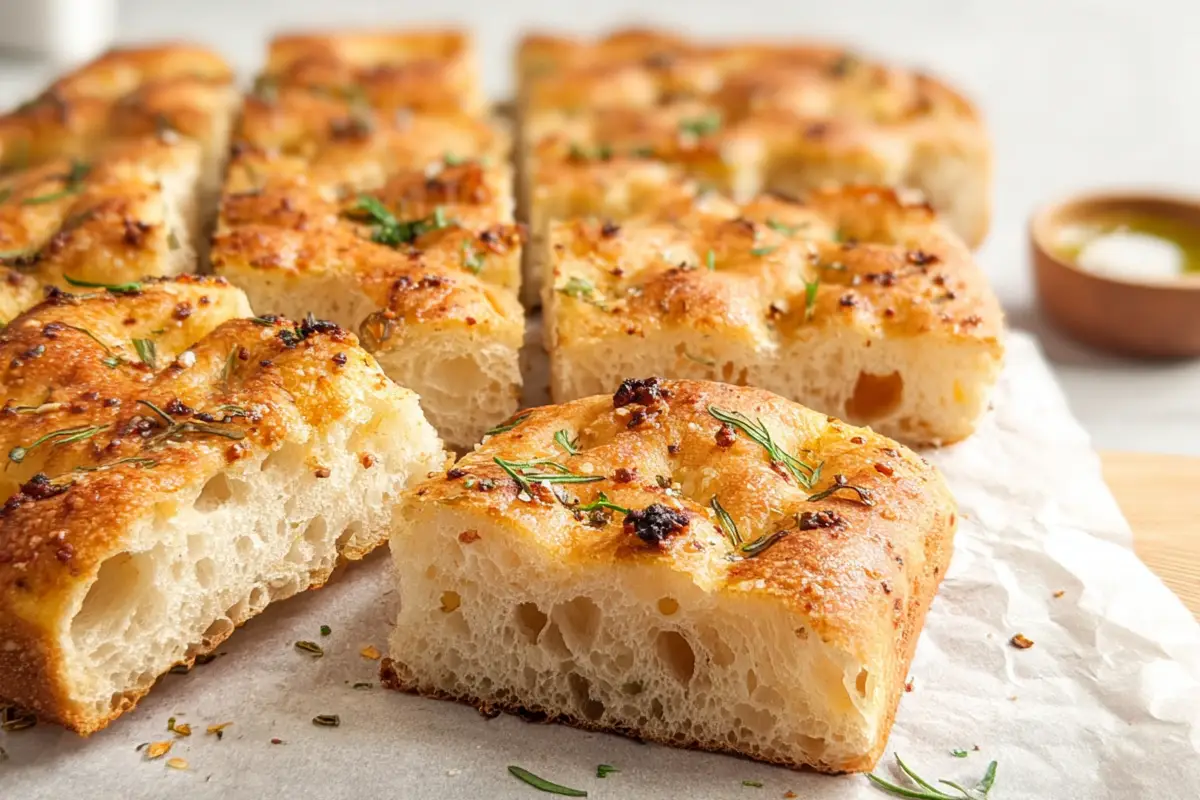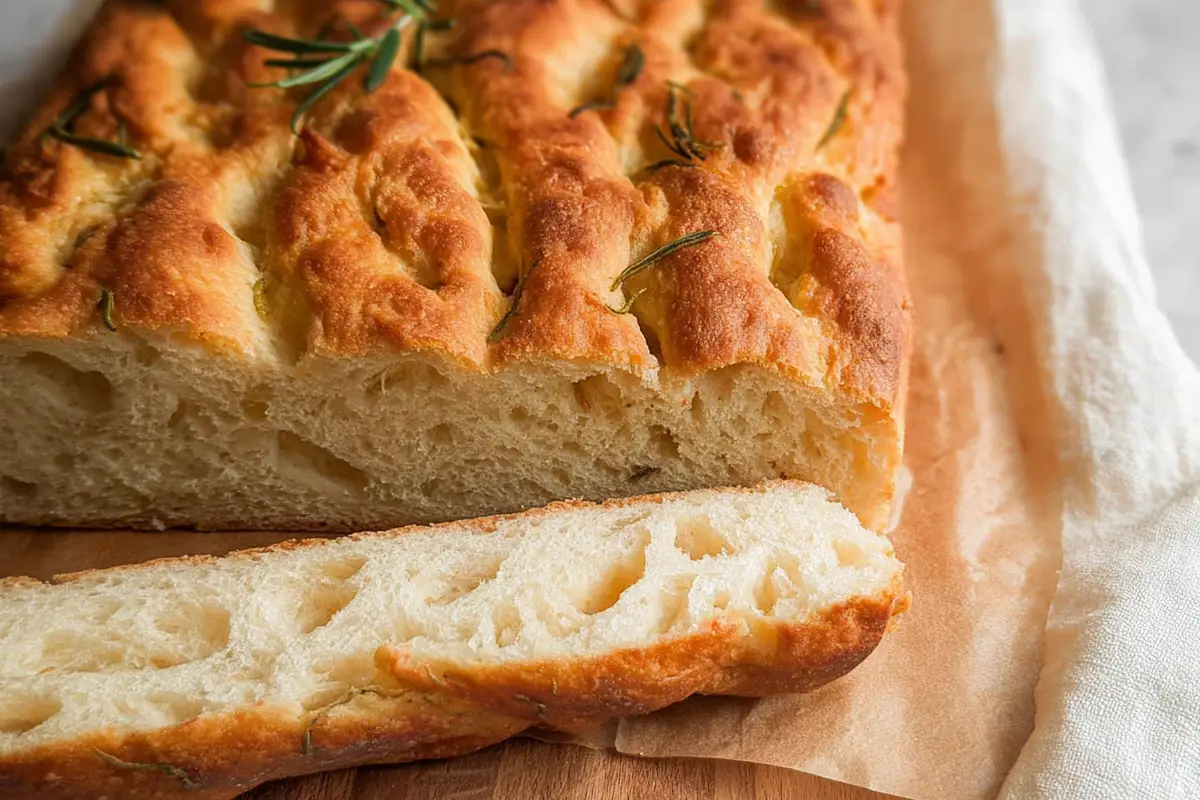- No commercial yeast needed—active sourdough starter and overnight cold ferment create natural lift and deep flavor.
- High-hydration, one-bowl method yields airy open crumb with crispy golden crust using stretch-and-folds, not kneading.
- Generous olive oil and dimpling produce signature texture; versatile toppings (garlic, rosemary, tomatoes, cheese) customize flavor.
- Store at room temp up to 2 days or freeze squares; reheat in oven for best crispness—avoid airtight plastic.
Last Updated on November 12, 2025 by Souhail
There’s something a little magical about pulling a tray of golden sourdough focaccia out of the oven. The scent of olive oil, rosemary, and crisping dough fills your kitchen and instantly makes it feel like a rustic Italian bakery. This sourdough focaccia recipe has become one of my absolute favorite ways to use up extra starter—and honestly, I’d choose it over store-bought bread any day.
I still remember the first time I tried making focaccia with my sourdough discard instead of commercial yeast. I was skeptical… Would it rise? Would it taste sour? Would the texture be weird? Spoiler alert: it was absolute perfection. Airy on the inside, crispy and golden on the outside, with all those beautiful dimples holding pools of olive oil and flaky salt. It’s the kind of bread that doesn’t even need butter—but a slather of whipped ricotta doesn’t hurt.
This sourdough focaccia recipe fits beautifully into weekend baking routines. Let the dough rest overnight, and by the next afternoon, you’ll have a bubbling, puffy dough ready to be transformed into golden deliciousness. It’s perfect as a side for soups or pastas, as a sandwich base, or just ripped apart and devoured straight from the pan. The flavor is deeply savory with just a whisper of tang, and the texture? Dreamy. Let me show you how to make it from scratch—no shortcuts, just naturally fermented, bakery-worthy bread.
Table of contents
- Why This Sourdough Focaccia Works So Beautifully
- Health Benefits of This Recipe
- How To Make Sourdough Focaccia Recipe
- My Best Tips for Sourdough Focaccia Success
- Fun Twists You Can Try on This Sourdough Focaccia Recipe
- How to Serve Your Focaccia Like a Pro
- How to Store and Reheat Sourdough Focaccia
- Fun Ways to Use This Focaccia Beyond Just Bread
- Frequently Asked Questions About Sourdough Focaccia Recipe
- Conclusion: You’re Going to Love This One
Why This Sourdough Focaccia Works So Beautifully
I’ve tested a lot of sourdough focaccia recipes over the years, and this focaccia never lets me down. Whether you’re looking for a show-stopping side dish or just craving a salty, chewy bite of artisan bread, this is the one you’ll want to come back to again and again.
Here’s what makes this focaccia recipe rise to the occasion (pun very much intended):
- No commercial yeast needed
This bread gets all its lift and flavor from your active sourdough starter. It’s a great way to lean into natural fermentation—and if you’re new to that world, check out this sourdough starter recipe for beginners to get started. - An overnight cold ferment develops flavor
Giving the dough a long, slow rest in the fridge builds deep flavor and structure. This step is where the magic happens—it turns a simple dough into something bakery-worthy. - High hydration for an open crumb
This dough is wetter than your typical bread dough, which creates those gorgeous airy pockets inside and a tender crumb. It’s sticky, yes, but so worth it. - Customizable toppings galore
I’m partial to garlic, rosemary, and flaky salt, but you can go wild. Think roasted tomatoes, caramelized onions, olives, or even cheese. Make it your own! - One bowl, no kneading, minimal effort
Stretch and folds are the name of the game here, not kneading. If you’re into low-effort, high-reward baking, this one’s your best friend. - Pairs beautifully with hearty meals
I love serving this with comforting soups like this lentil soup recipe or alongside saucy mains like baked dumplings (yes, that’s a thing—check out this dumpling bake recipe).
Health Benefits of This Recipe
Naturally fermented: Easier to digest than yeasted bread1
No added sugar: Just clean, simple ingredients
Rich in healthy fats: Thanks to the olive oil
Vegan-friendly: As long as your toppings are plant-based
How To Make Sourdough Focaccia Recipe
My Best Tips for Sourdough Focaccia Success
Making focaccia with sourdough might sound a little advanced, but trust me—it’s easier than you think. Here’s how to make sure yours turns out tender, crisp, and totally irresistible.
- Use a bubbly, active starter
Your starter should be at its peak, meaning it’s doubled in size and passes the float test (a spoonful floats in water). This gives the dough the strength it needs to rise. - Embrace the wet dough
The high hydration is key for those signature airy holes. It might feel messy, but don’t be tempted to add too much extra flour. - Give it time
This isn’t a recipe you can rush. Let the dough rest overnight in the fridge—it builds flavor and makes it easier to handle. - Olive oil is your best friend
Don’t be shy with the oil. It helps the crust crisp up, prevents sticking, and adds flavor. Drizzle it on top, under the dough, and all around the edges. - Get creative with toppings
Garlic and rosemary are classics, but try sliced red onions, sun-dried tomatoes, or even pumpkin seeds. Speaking of which, if you’re into autumn flavors, you might also love this sourdough pumpkin bread or even a cozy homemade pumpkin bread.
Fun Twists You Can Try on This Sourdough Focaccia Recipe
One of the best things about focaccia is how versatile it is. Once you’ve got the base recipe down (which I’ll share below), you can let your creativity shine with toppings and flavors. Here are some of my favorite variations that totally transform the taste and vibe of the bread.
1. Garlic Herb Focaccia (My Go-To Version)
This is the classic. I like to infuse olive oil with minced garlic and fresh rosemary, then drizzle it generously over the dough just before baking. As it bakes, the garlic crisps up, the herbs become fragrant, and the flavor is deeply savory. Finish with flaky sea salt for the ultimate touch.
2. Cherry Tomato & Basil Focaccia
Add halved cherry tomatoes and torn fresh basil leaves before baking. The tomatoes roast into sweet, jammy bursts that contrast beautifully with the tang of the sourdough. Perfect for summer or alongside a pasta dinner.
3. Caramelized Onion & Thyme Focaccia
Slowly cook onions until golden and sweet, then spread them over the dough along with fresh thyme leaves. This version is earthy, slightly sweet, and great with a sharp cheese board or roasted veggies.
4. Olive & Za’atar Focaccia
Go Mediterranean with sliced kalamata olives, a sprinkle of za’atar, and a drizzle of olive oil. The brininess of the olives with the herby warmth of za’atar is completely addictive.
5. Cheesy Jalapeño Focaccia
Shredded cheddar, sliced jalapeños, and maybe a little garlic powder? Yes, please. This version has a bit of heat and loads of flavor—amazing with chili or as a sandwich base.
6. Sweet Grape & Honey Focaccia
This might sound strange, but trust me: halved red grapes, a drizzle of honey, and a little rosemary make for a stunning sweet-savory focaccia that’s lovely with cheese or even for brunch.
How to Serve Your Focaccia Like a Pro
Once your sourdough focaccia is baked and golden, the fun isn’t over. Let’s talk about how to serve it to really bring out its full delicious potential.
This focaccia makes a killer side dish—try pairing it with a bowl of cozy lentil soup or a tomato-based stew. It also holds up beautifully as the base for a sandwich, especially one layered with grilled veggies, pesto, and mozzarella.
For appetizers, slice it into strips and serve it with a trio of dips: think olive tapenade, whipped feta, and good balsamic vinegar with EVOO. Hosting a party? Cut it into small squares and serve warm on a wooden board—it’s rustic and inviting.
A little tip: I love warming leftovers and topping with a runny fried egg in the morning. Total game-changer.
How to Store and Reheat Sourdough Focaccia
This focaccia is best the day it’s made, but it holds up pretty well if stored correctly.
To store:
Let the focaccia cool completely, then wrap it loosely in parchment or place in a paper bag inside a bread box. Avoid airtight plastic containers—they’ll make the crust go soft. It will stay good at room temp for up to 2 days.
To freeze:
Cut it into squares and wrap them individually. Store in a freezer bag for up to 1 month. To reheat, pop frozen squares into a 350°F oven for 10–12 minutes until warm and crisped.
To reheat leftovers:
Use the oven or a toaster oven to restore that crisp edge. A quick 5–7 minutes at 350°F usually does the trick. Avoid microwaving unless you’re okay with soft, chewy bread (still tasty, but not the same!).
Fun Ways to Use This Focaccia Beyond Just Bread
Leftover focaccia is like a secret ingredient in your fridge—here are a few clever ways to use it:
- Focaccia Croutons: Cube it, toss in olive oil and herbs, and bake until crisp. Perfect for topping salads or soups.
- Panini Heaven: Slice horizontally and fill with your favorite meats, cheeses, and spreads. Press in a panini maker or a hot skillet.
- Bread Pudding (Savory Style): Use cubes of stale focaccia with eggs, cream, sautéed veggies, and cheese for a rich baked breakfast casserole.
- Mini Pizzas: Top slices with marinara, mozzarella, and your favorite toppings, then broil for a quick snack or kid-friendly dinner.
Frequently Asked Questions About Sourdough Focaccia Recipe
It’s likely your starter wasn’t active enough. Make sure it’s fed and bubbly before mixing the dough. Cold kitchen temperatures can also slow fermentation.
You can, but the flavor and texture won’t be as complex. The cold ferment really builds that sourdough tang and open crumb.
You can, but you’ll need to add commercial yeast since discard isn’t active enough to leaven on its own. Try mixing 1 tsp of instant yeast with your discard for a quicker version.
Bread flour gives the best structure and chew, but all-purpose can work in a pinch—it’ll just be slightly softer.
Use plenty of olive oil! Coat the bottom and sides generously, and consider using a metal pan for better release and crisping.
Yes! First, cut into squares, freeze on a baking sheet, then transfer to a freezer bag. Reheat at 350°F straight from frozen for best results.
Conclusion: You’re Going to Love This One
There’s something deeply satisfying about making bread from just flour, water, salt, and your own wild yeast. This sourdough focaccia recipe is simple yet impressive, rustic yet refined, and endlessly adaptable. In any case, whether you top it with herbs, tomatoes, or nothing at all, it’s sure to be a hit.
If you love this recipe, you might also enjoy my sourdough pumpkin bread or this comforting lentil soup to serve on the side.
So, try it out, and when you do, don’t forget to leave a comment or tag me with your golden, dimpled beauties. I’d love to see your creations!


